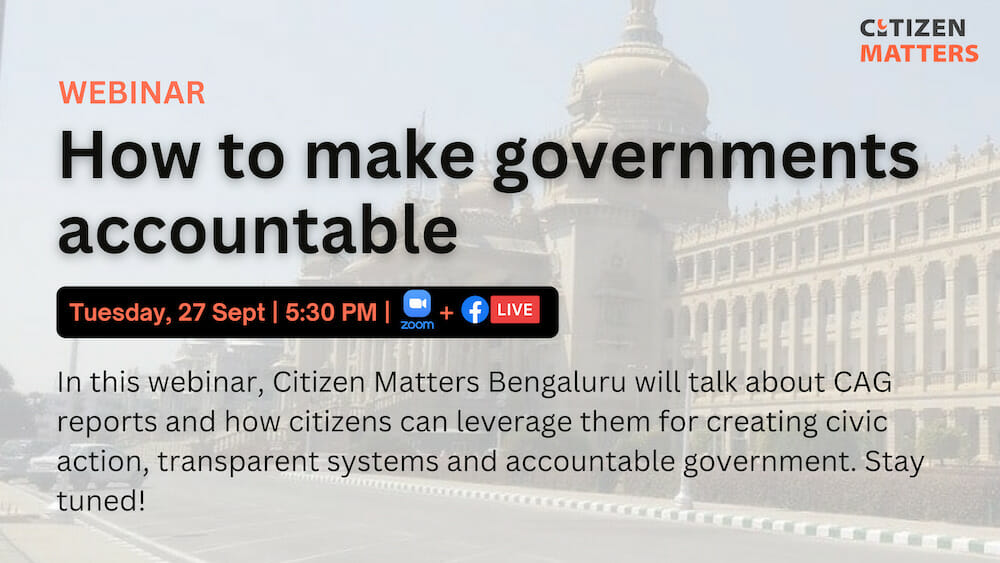The Comptroller and Auditor General (CAG) Reports are a compilation of financial audits, compliance audits, and performance audits of the central government and state governments. The Indian Audit & Accounts (IA& AD), headed by the Comptroller and Auditor General of India, audits almost all branches of Government at every level. The reports offer insights on the nuanced workings of governance.
Citizen Matters series on Understanding Public Project Audits, curated by experts from the CAG, tells us how these reports can be leveraged by citizens to hold their local governments accountable. For instance, when the office of Accountant General (Audit II) conducted the audit of Karnataka State Road Safety Authority (KSRSA) between 2014 and 2021, it found that there was no reduction in road accidents until 2019. The report also revealed that BBMP roads were the most hazardous with an average of 19 to 20 hazards per kilometre.
This scrutiny helps citizens understand what is happening in their local and hyperlocal contexts, and can accordingly demand action from their urban representatives. To highlight this, Citizen Matters organised a webinar on how CAG reports can be leveraged to make governments more accountable.

The panelists were EP Nivedita, a civil servant in the Indian Audit and Accounts Service (IAAS)-batch of 1993 and a recipient of CAG’s Award for Excellence and Innovation in Audit for the Performance Audit Report on Management of Stormwater in Bengaluru; Himanshu Upadhyaya, Assistant Professor at Azim Premji University, who writes on public finance and accountability; and Anjali Saini, who works with a civic community group, Whitefield Rising.
Useful for citizens
Nivedita says that the CAG is a completely autonomous body that is only answerable to the Constitution. “It was envisaged that it would be one of the pillars of our democracy, and the duty of the CAG was to help establish accountability of the executor,” she says.
According to Nivedita, most of the audit reports are in the public domain that makes it possible for citizens to read them and understand the shortcomings of governance. Whitefield Rising’s Anjali Saini counters that and says even as informed citizens, and people who have been interacting with citizens and with the government, many people are actually unaware of many of the data points in the reports.
Read more: Bengaluru’s stormwater drain story: Lack of planning, design, maintenance
Further, Anjali says that as constitutionally appointed bodies, Ward Committees must take forward the data points mentioned in the reports. The rules under the Karnataka Municipal Act, 1976, prescribe that the BBMP Commissioner has to provide the committees data on budgetary allocations and expenditure of the developmental projects underway. “But we are unable to get that information out of the Corporators or Ward engineers today” says Anjali, adding that while there is relevant information within the reports, they are lost in translation.
Read more: How citizens can use audit reports to be effective watchdogs
Better dissemination of content
The panelists stressed the need to disseminate the information in the reports in a way that can be easily understood by citizens. However, Himanshu Upadhyaya says that there have been efforts by the CAG to do just that. “Citizens needs to come out of the impression that the audits are all about accounts and figures” he remarks.

A performance audit report of Conservation and Ecological Restoration of Lakes under the jurisdiction of Lake Development Authority (LDA), he says, included innovative ideas to make it easier for citizens to engage with the data. “The audit inspections came with photographic evidence and QR codes that citizens could scan to ascertain the condition of stormwater drains,” he says. He adds that the inspection efforts by the auditors, which have built evidence for systemic reforms, need to be lauded.
Nivedita says the reports are very detail-oriented and have a high level of precision, which makes it a laborious task to convert them to easily readable formats. “Citizen groups can organise public readings of the report and hold discussions in the local language to counter this,” says Himanshu. There is a need for a more robust public discussions surrounding it, the panelists say.
Possibility and potential of CAG reports
Reliable data allows for citizens to discern vested political interests and misinformation, Anjali Saini states. Hence, the discussion focused on the role of media and civil society organisations (CSO) in using the reports to strengthen their engagement with government bodies. While the granularity or specificity mentioned in the reports were lauded, there was still the hurdle of translating the information into action.
Nivedita says while the CAG is constitutionally bound to assist the legislature, CSOs have no such qualms and urges them to publicise the reports and make them actionable. Organisations should curate explained, not just on the day the report is tabled, to trigger public engagement with the reports,” Himanshu adds.
One can start small at ward levels and start interacting with their Corporators, Nivedita says. There has to be a persistent engagement with citizen bodies to realise the full potential of the CAG reports, she concludes.
Watch the complete discussion here.